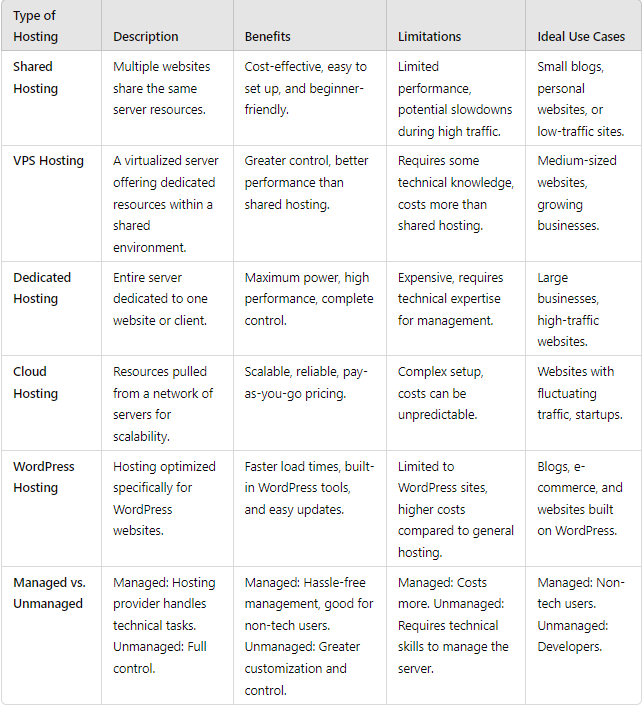Why Choosing the Right Web Hosting Matters
Your website’s performance hinges on the web hosting provider you choose. With studies showing that 40% of users abandon websites that take over 3 seconds to load, finding a provider that delivers speed and reliability is more important than ever. Having tested and reviewed hosting providers for over a decade, I’m here to guide you through the best solutions tailored to your unique needs. Whether you’re after blazing-fast load times, ironclad security, or scalable plans, this comprehensive guide will ensure your website thrives in 2024. Let’s get started!

Types of Web Hosting
Web hosting is widely discussed, but deciding on the type of hosting could be quite a challenge. All the options above thus has their own strengths, weaknesses and suitable applications. Below are some following tips to enable you to identify which type serves your needs appropriately.
Shared Hosting
Shared hosting is the most beginner-friendly and affordable option, where multiple websites share resources on a single server.
Benefits:
- Budget-friendly for small businesses and personal sites.
- Easy setup with minimal technical knowledge required.
- Often includes one-click installations for CMS platforms like WordPress.
Limitations:
- Limited server resources can result in slower performance during high traffic.
- Vulnerable to security risks if other sites on the server are compromised.
Ideal For:
- Beginners, bloggers, and small business owners with low to moderate traffic.
VPS Hosting
VPS is serving the same infrastructure as multiple other virtual servers but offering the client a certain percentage of the server resources.
Benefits:
- People residing in shared hosting will have better performance and reliable as compared with the shared hosting services.
- Customizable with root access for advanced configurations.
- Isolated resources reduce risks from neighboring websites.
Limitations:
- Higher cost than shared hosting.
- Requires some technical expertise to manage effectively.
Ideal For:
- Medium-sized businesses or developers needing more control and scalability.
Dedicated Hosting
With dedicated hosting, you have an entire server to yourself, offering maximum power and flexibility.
Benefits:
- Unparalleled performance with no resource sharing.
- Full control over server configuration.
- Enhanced security options.
Limitations:
- High cost, often suitable only for large budgets.
- Requires in-depth technical knowledge or hiring a server administrator.
Ideal For:
- High-traffic websites, large e-commerce stores, or enterprises with specific hosting needs.
Cloud Hosting
Cloud hosting leverages multiple servers working together to host your website, ensuring scalability and reliability.
Benefits:
- Seamless scalability to handle traffic spikes.
- Pay-as-you-go pricing models for cost efficiency.
- High uptime due to distributed server architecture.
Limitations:
- Can be more expensive than shared or VPS hosting.
- May require a learning curve to understand cloud-based systems.
Ideal For:
- Websites experiencing fluctuating traffic or needing high availability.
WordPress Hosting
WordPress hosting is tailored specifically for WordPress websites, optimizing performance and providing WP-centric features.
Benefits:
- Pre-configured servers for WordPress sites.
- Automatic updates, backups, and enhanced security measures.
- Often includes tools like staging environments and WP-CLI support.
Limitations:
- Limited to WordPress users.
- Higher costs than basic shared hosting.
Ideal For:
- Bloggers, entrepreneurs, and businesses running WordPress-powered websites.
Managed vs. Unmanaged Hosting Options
Choosing between managed and unmanaged hosting depends on your technical expertise and time investment.
Managed Hosting:
- Hosting provider handles server maintenance, updates, and security.
- Ideal for users who want a hands-off experience.
- Higher costs due to added support.
Unmanaged Hosting:
- You’re responsible for all server management tasks.
- Offers greater control and lower costs.
- Best suited for experienced developers or IT teams.
By understanding these hosting types, you’ll be equipped to pick the perfect solution for your website’s performance, scalability, and budgetary needs.

Best Web Hosting Providers Reviewed By Our Experts
Several attributes need to be considered so that your website functions effectively once you decide on a web hosting provider. Here are the key criteria used to evaluate the best hosting providers:
1. Server Uptime and Reliability Metrics
Your website’s availability depends on the host’s uptime performance.
- Why It Matters: Frequent downtime can hurt your website’s reputation, SEO rankings, and user experience.
- What to Look For: Providers offering at least 99.9% uptime guarantees with reliable server monitoring.
2. Loading Speed and Performance Benchmarks
Fast loading times are crucial for retaining users and improving SEO.
- Why It Matters: Websites that load in under 3 seconds have better engagement and conversion rates.
- What to Look For: Hosting providers with SSD storage, CDN integration, and optimized server architecture.
3. Security Features and SSL Certificates
A secure hosting environment is essential to protect your data and user trust.
- Why It Matters: Cyberattacks and data breaches can lead to significant losses.
- What to Look For:
- Free or premium SSL certificates.
- DDoS protection and firewalls.
- Malware scanning and automatic updates.
4. Customer Support Quality and Response Times
Reliable support ensures that issues are resolved quickly.
- Why It Matters: Technical problems can arise unexpectedly, and quick support minimizes downtime.
- What to Look For:
- 24/7 customer support via live chat, email, or phone.
- Fast response times and knowledgeable agents.
- Community forums or extensive documentation.
5. Pricing Plans and Value for Money
Affordable pricing with balanced features is a priority for most users.
- Why It Matters: Overpaying for unnecessary features or being locked into a bad contract can be costly.
- What to Look For:
- Transparent pricing with no hidden fees.
- Free trials or money-back guarantees.
- Discounts on long-term plans.
6. Backup and Restoration Capabilities
Backups provide peace of mind in case of data loss or site issues.
- Why It Matters: Regular backups protect against accidental deletions, hacks, or server crashes.
- What to Look For:
- Automatic daily or weekly backups.
- Easy-to-use restoration tools.
- Options for manual backups.
7. Resource Allocation and Scalability Options
As your website grows, your hosting plan should adapt to increased traffic.
- Why It Matters: Insufficient resources can lead to slow load times and crashes during high traffic.
- What to Look For:
- Scalable plans with flexible resource allocation (CPU, RAM, bandwidth).
- Upgrade paths to VPS or dedicated hosting.
- Cloud hosting for dynamic scalability.
By assessing hosting providers against these criteria, you can confidently choose a service that delivers the best performance, security, and value for your website.
Best Budget-Friendly Web Hosting Solutions
Economical web hosting is especially important if the user is an individual or a representative of a small business. Nevertheless, cost, must not be a compromise on the capabilities and steadiness of the devices. Here’s a comprehensive guide to the best budget-friendly hosting solutions:
Entry-Level Hosting Plans Comparison
Entry-level plans are typically shared hosting packages aimed at beginners.
Key Features to Compare:
- Storage space and bandwidth.
- Number of websites allowed.
- Email accounts and database support.
- CMS compatibility (e.g., WordPress).
Top Providers:
- Hostinger: Known for its ultra-low starting price and great performance.
- Bluehost: Offers a beginner-friendly interface and WordPress optimization.
- Namecheap: Combines affordability with solid features.
Hidden Costs to Watch Out For
Budget plans may have additional charges that can inflate the cost over time.
Examples of Hidden Costs:
- Renewal rates that are significantly higher than the introductory price.
- Fees for email hosting, backups, or advanced security features.
- Extra charges for site migrations or add-on services.
Free Domain and SSL Offerings
Many budget hosts include free domains and SSL certificates to add value.
- Why It Matters: A free domain can save you $10–$15 annually, and an SSL certificate ensures website security.
- What to Look For:
- Providers offering free domain registration for the first year.
- Free Let’s Encrypt SSL or premium options for higher security.
Money-Back Guarantee Policies
A money-back guarantee lets you test the hosting service without financial risk.
- Why It Matters: If the service doesn’t meet your expectations, you can easily switch providers.
- Typical Guarantee Periods:
- 30 days: Industry standard (e.g., Bluehost, SiteGround).
- 45–90 days: Offered by some providers for added flexibility (e.g., InMotion Hosting).
Resource Limitations
Budget plans often come with restrictions, so understanding them is critical.
- Common Limitations:
- Limited disk space and monthly traffic.
- Restrictions on the number of databases or email accounts.
- Performance throttling during traffic spikes.
- How to Mitigate: Choose a provider with transparent resource limits and upgrade options for future growth.
Upgrade Paths and Flexibility
Your hosting needs may change as your website grows, so scalability is vital.
- Why It Matters: Providers with flexible upgrade paths save you from migrating to a new host later.
- What to Look For:
- Seamless upgrades to VPS, dedicated, or cloud hosting plans.
- Adjustable resources without downtime.
- Discounted rates for long-term customers upgrading to higher plans.
Cheap web hosting doesn’t always mean poor quality. It’s important to look for transparent and straightforward pricing, without hidden fees. The tools should be reliable to meet your needs and scalable to grow with your website. By carefully assessing available plans, a website owner can find an affordable option that provides the right services without compromising performance.
Premium Web Hosting Providers for Business
Enterprises with a high traffic, complex requirements, or security requirements are served with a premium hosting plan as the hosting provider aims at maximization of performance. Here’s what sets premium hosting apart and the features to look for:
1. Enterprise-Grade Hosting Solutions
Premium hosting plans are built to handle demanding workloads and provide exceptional uptime.
Key Features:
- High-performance servers with advanced hardware.
- Dedicated resources tailored for large-scale websites and applications.
- Enhanced uptime guarantees, often 99.99% or higher.
Top Providers:
- Kinsta: Managed WordPress hosting with Google Cloud infrastructure.
- Liquid Web: Reliable for dedicated and VPS hosting with powerful configurations.
- AWS (Amazon Web Services): Ideal for custom enterprise-level solutions.
2. Advanced Security Features
Premium hosting includes comprehensive security protocols to safeguard sensitive data.
- Why It Matters: Cyberattacks can severely impact a business’s reputation and operations.
- Key Offerings:
- Advanced firewalls and DDoS protection.
- Malware scanning and removal tools.
- Intrusion detection systems (IDS) and regular security audits.
- Compliance with industry standards like PCI DSS and GDPR.
3. Dedicated IP Addresses
A dedicated IP is often essential for businesses requiring higher control and security.
- Benefits:
- Improved email deliverability for marketing campaigns.
- Necessary for advanced SSL certificates like EV SSL.
- Greater control over server access and configurations.
- Who Needs It: E-commerce platforms, SaaS providers, and businesses handling sensitive customer data.
4. Premium Support Services
Top-tier support ensures that businesses receive immediate assistance when needed.
Features to Expect:
- 24/7 priority support via multiple channels (live chat, phone, ticketing).
- Dedicated account managers for personalized service.
- Proactive monitoring and issue resolution before problems escalate.
Providers with Exceptional Support:
- WP Engine: Specialized WordPress hosting support with expert engineers.
- Nexcess: Hands-on assistance for e-commerce and enterprise hosting.
5. Custom Server Configurations
Businesses with unique requirements benefit from custom setups tailored to their needs.
- Advantages:
- Custom software installation and configurations.
- Optimized database and caching for high traffic.
- Flexibility to adapt resources based on business goals.
- Who Offers This: Providers like AWS, Liquid Web, and A2 Hosting offer extensive customization options.
6. Load Balancing and CDN Integration
Ensuring website availability and fast loading speeds is critical for business success.
- Load Balancing: Distributes traffic across multiple servers to prevent overload and downtime.
- Content Delivery Networks (CDNs):
- Cache static content closer to users for faster loading times.
- Improve global reach and reduce latency.
- Here’s a comprehensive overview of Content Delivery Networks (CDNs)
- Examples of Providers:
- Cloudflare: Industry-leading CDN services with DDoS protection.
- Google Cloud Platform: Combines CDN with load balancing for robust performance.
Enterprise hosting solutions are tailored for businesses that need high performance, security, and customization. These solutions often include features like dedicated IPs, advanced configurations, and premium support, making them ideal for rapidly growing companies and high-traffic websites. It’s essential to choose a provider whose goals align with your business to prevent interruptions and ensure smooth operations.
Specialized Hosting Solutions
Some hosting solutions are specific for given industries or uses cases. Here’s an overview of specialized hosting options to help you find the perfect fit for your project or business:
1. E-Commerce Hosting Platforms
E-commerce websites require fast, secure, and scalable hosting to handle transactions and provide a seamless user experience.
Key Features:
- Optimized for platforms like WooCommerce, Shopify, or Magento.
- Integrated SSL certificates and PCI compliance for secure payments.
- Built-in tools for inventory management and shopping carts.
Top Providers:
- Shopify: An all-in-one e-commerce platform with hosting included.
- SiteGround: Specialized WooCommerce hosting with excellent performance.
- BigCommerce: Ideal for larger online stores needing scalability.
2. Video Streaming Optimized Hosting
For video-heavy websites or streaming platforms, hosting needs to focus on bandwidth and content delivery.
Key Features:
- High bandwidth and storage for large video files.
- Integration with CDNs for faster streaming.
- Transcoding support for different devices and resolutions.
Top Providers:
- Vimeo OTT: Designed for on-demand and live video streaming.
- AWS Media Services: Scalable hosting with transcoding and live streaming capabilities.
- Kaltura: Enterprise-grade hosting for video delivery.
3. Database Hosting Solutions
Database hosting is essential for applications that rely on fast and secure access to structured data.
Key Features:
- High IOPS (Input/Output Operations Per Second) for quick data retrieval.
- Support for databases like MySQL, PostgreSQL, and MongoDB.
- Automated backups and failover solutions.
Top Providers:
- Amazon RDS: Managed database hosting with scalability and redundancy.
- Google Cloud SQL: Excellent for cloud-based database applications.
- DigitalOcean: Developer-friendly with database clusters.
4. Game Server Hosting
Game servers demand low latency and high performance to provide smooth multiplayer experiences.
Key Features:
- Low ping rates and DDoS protection.
- Flexible server configurations for custom mods and plugins.
- High uptime and reliable connections.
Top Providers:
- Host Havoc: Popular for hosting games like Minecraft and ARK.
- GTXGaming: Customizable hosting for various multiplayer games.
- OVHcloud: Scalable options for larger gaming communities.
5. Reseller Hosting Packages
Reseller hosting is designed for businesses or individuals who want to offer hosting services to their clients.
Key Features:
- White-label branding options.
- Easy client management with control panels like WHM and cPanel.
- Scalable plans to grow with your customer base.
Top Providers:
- A2 Hosting: Known for speed and white-label solutions.
- ResellerClub: Offers domain registration alongside hosting.
- InMotion Hosting: Robust reseller packages with extensive support.
6. Developer-Friendly Hosting Features
Developers need hosting solutions that support testing, deployment, and customization.
Key Features:
- Support for multiple programming languages like PHP, Python, and Ruby.
- Git integration for version control.
- Staging environments for testing before live deployment.
Top Providers:
- Heroku: Ideal for deploying web applications in various languages.
- Linode: Customizable hosting with extensive developer tools.
- Vultr: Affordable VPS hosting with a developer-friendly API.
There are unique service offerings to cater to specific niches, such as hosting services for e-commerce, gaming, and more. Selecting the right provider based on your requirements ensures optimal performance, security, and scalability for your project. Be selective when assessing providers to ensure you choose the best hosting solutions aligned with your company’s objectives.
These are the key points we consider when choosing the right web hosting provider.
Selecting the ideal hosting provider is a critical decision that impacts your website’s performance, reliability, and scalability. Here’s a comprehensive guide to help you make an informed choice:
1. Assessing Your Website Needs
Understanding your website’s purpose and requirements is the first step.
- Key Questions to Ask:
- Is it a blog, portfolio, e-commerce store, or business website?
- Will you host multiple websites or just one?
- Do you need CMS-specific hosting, like WordPress?
- Example Scenarios:
- A small blog might thrive on shared hosting.
- An e-commerce site requires hosting with enhanced security and performance.
2. Traffic Volume Considerations
Your expected traffic levels determine the resources you’ll need.
- Low-Traffic Websites: Shared hosting or basic VPS plans are sufficient.
- Moderate to High-Traffic Websites: Consider VPS, dedicated, or cloud hosting for better performance.
- Key Metrics to Check:
- Monthly bandwidth allowances.
- Server scalability during traffic spikes.
3. Budget Planning and ROI
Hosting costs can vary widely, so align your budget with your goals.
- Factors to Consider:
- Initial vs. renewal prices (watch for hidden fees).
- Additional costs for features like SSL, backups, or dedicated IPs.
- Long-term ROI from reliable hosting and fewer downtimes.
- Budget Tip: Opt for providers offering a money-back guarantee to test their services risk-free.
4. Technical Requirements Checklist
Your hosting provider must support the technologies and frameworks your website relies on.
Key Considerations:
- Server compatibility with your CMS or platform (e.g., WordPress, Magento).
- Programming language and database support (PHP, Python, MySQL, etc.).
- Operating system preferences: Linux or Windows hosting.
- Availability of advanced features like SSH access, staging environments, or Git integration.
5. Growth Potential Evaluation
Choose a hosting provider that can grow with your website.
- Scalability Features to Look For:
- Seamless upgrades to higher-tier plans (VPS, dedicated, or cloud).
- Resource flexibility (RAM, CPU, bandwidth).
- Support for adding more websites or domains.
- Why It Matters: A scalable solution saves you from migrating to a new host as your website expands.
6. Migration Support Availability
Switching providers or upgrading plans can be daunting, but good hosting providers offer migration assistance.
What to Look For:
- Free or low-cost website migration services.
- Dedicated support to minimize downtime during the transition.
- Clear migration policies and compatibility checks.
If you choose a poor web hosting provider, you’re likely to end up with a service that fails to meet your requirements, website traffic needs, budget, and expected future growth. Narrowing down your options from a wide range of web hosting’s can be challenging, and it requires understanding key features such as technical specifications, scalability, and the level of support available. By evaluating these factors, you can select a host that will ensure optimal performance for years to come.
Conclusion
Choosing the perfect web hosting isn’t as tricky as it may seem! By accurately evaluating your existing requirements, financial capabilities, and future development plans, you can select a hosting solution that perfectly meets your needs.
When choosing web hosting services, some key considerations include dependability, flexibility, and company support. These factors ensure your site runs smoothly and stays online. Regardless of the size of your business, whether you’re a small blogger or a large enterprise owner, the right web hosting provider can enhance your online presence and provide a solid foundation for success.
Looking to make your website more professional? Check out our selected list of the best hosting providers that will help you choose the right assistance to meet your needs. While you may have complex questions, with the right hosting, your website will be set up for growth, stability, and excellent performance.
Knowledge is the foundation of progress.
Additional Resources
Find more reading material on web development, web tools, hosting, CDNs, and WordPress.



